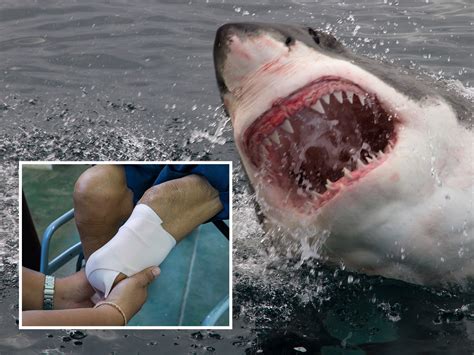
A 9-year-old girl was bitten by a shark while snorkeling in the Florida Keys on Saturday, according to family reports. The incident occurred in relatively shallow water and resulted in injuries that required medical attention.
A 9-year-old girl suffered injuries from a shark bite while snorkeling in the Florida Keys on Saturday, prompting a swift response from her family and local authorities. The incident took place in the Content Keys, located west of Grassy Key. The girl, whose name has not been released, was snorkeling in water approximately two feet deep when the shark attacked.
“She was snorkeling in two feet of water when it happened,” stated the family in their official report, highlighting the unexpected nature of the incident given the shallow depth.
Following the bite, the girl was immediately taken to shore, where initial first aid was administered. The quick thinking and actions of those present were crucial in stabilizing her condition before professional medical help arrived. Emergency services were promptly contacted, and the girl was transported to a nearby medical facility for further treatment and evaluation.
Details regarding the specific type of shark involved in the attack have not yet been officially confirmed, and authorities are currently investigating the incident to gather more information. The Florida Fish and Wildlife Conservation Commission (FWC) has been notified and is involved in the investigation, which will include assessing the circumstances surrounding the attack and identifying potential contributing factors.
The incident serves as a reminder of the inherent risks associated with marine activities, even in seemingly safe environments. While shark attacks are relatively rare, they can occur unexpectedly, emphasizing the importance of caution and awareness when entering the water. The incident has prompted local authorities to reiterate safety guidelines and recommendations for swimmers and snorkelers in the Florida Keys.
Contextual Background and Expert Insights
Shark attacks, while statistically infrequent, can generate significant public concern, particularly when they involve children or occur in popular tourist destinations. Florida, with its extensive coastline and warm waters, is known to have a high number of shark encounters compared to other regions. However, the vast majority of these encounters are minor, resulting in minimal or no injuries.
Dr. Michael Heithaus, a marine biologist and shark expert at Florida International University, explains that “shark bites are exceedingly rare events when you consider the millions of people who enter the water every year.” He emphasizes that sharks are not intentionally targeting humans as prey. “Most bites are cases of mistaken identity, where a shark may misinterpret a swimmer or surfer as a potential food source, such as a fish.”
Several factors can influence the likelihood of shark encounters, including water clarity, time of day, and the presence of baitfish or other marine life that attract sharks. “Sharks are most active during dawn and dusk, which are their primary feeding times,” Dr. Heithaus notes. “Additionally, murky water can reduce visibility, increasing the chances of a shark misidentifying a human.”
The Florida Fish and Wildlife Conservation Commission (FWC) provides numerous resources and guidelines to help people minimize their risk of shark encounters. These include recommendations to avoid swimming during dawn and dusk, staying out of the water when baitfish are present, and avoiding wearing shiny jewelry that could attract sharks. The FWC also emphasizes the importance of swimming in groups and staying close to shore.
Local Response and Community Impact
The shark bite incident has understandably raised concerns among residents and visitors in the Florida Keys. Local authorities have responded by increasing patrols along the affected beaches and providing updated safety information to the public. The Monroe County Sheriff’s Office has also been working closely with the FWC to monitor shark activity in the area.
“We want to assure the public that we are taking this incident very seriously,” said Sheriff Rick Ramsay in a statement. “We are committed to ensuring the safety of our residents and visitors, and we will continue to work with our partners at the FWC to monitor the situation and provide timely updates.”
The local tourism industry, which is a vital part of the Florida Keys economy, is also closely monitoring the situation. Tourism officials have emphasized that shark attacks are rare events and that the Florida Keys remain a safe and welcoming destination for visitors. However, they also acknowledge the importance of providing accurate information and promoting responsible behavior to minimize risks.
“We understand that this incident may cause some concern, but we want to reassure everyone that the Florida Keys are still a safe place to visit,” said Stacey Mitchell, director of the Monroe County Tourist Development Council. “We encourage visitors to follow the safety guidelines provided by the FWC and to be aware of their surroundings when entering the water.”
Shark Bite Statistics and Trends
According to the International Shark Attack File (ISAF), maintained by the Florida Museum of Natural History at the University of Florida, the United States consistently ranks as the country with the highest number of reported shark bites. Florida accounts for the majority of shark bites in the U.S., although the vast majority are considered minor.
In 2023, Florida recorded 16 unprovoked shark bites, representing 44% of the total reported in the United States. Unprovoked bites are defined as incidents where a shark bites a live human in its natural habitat without any human provocation. These figures highlight Florida’s position as a hotspot for shark encounters.
The ISAF data also reveals that the risk of being bitten by a shark is extremely low. The chances of being bitten are approximately 1 in 3.7 million. Furthermore, the likelihood of a shark bite being fatal is even lower, with a fatality rate of less than 10%.
“While shark bites can be traumatic events, it’s important to remember that they are statistically rare,” said Gavin Naylor, director of the ISAF. “The ocean is a vast and complex environment, and sharks play a vital role in maintaining its health and balance. By understanding their behavior and taking appropriate precautions, we can minimize the risk of encounters and coexist peacefully with these fascinating creatures.”
Safety Recommendations and Best Practices
In light of the recent shark bite incident, it is essential to reiterate safety recommendations for swimmers and snorkelers in the Florida Keys and other coastal areas:
- Avoid Swimming During Dawn and Dusk: Sharks are most active during these times, as they are their primary feeding periods.
- Stay Out of the Water When Baitfish Are Present: Baitfish attract sharks, increasing the likelihood of encounters. Look for signs of schooling fish or seabird activity.
- Avoid Wearing Shiny Jewelry: Shiny objects can resemble the scales of fish and attract sharks.
- Swim in Groups: Sharks are less likely to approach groups of people.
- Stay Close to Shore: This allows for a quicker exit from the water if necessary.
- Avoid Murky Water: Reduced visibility increases the chances of a shark misidentifying a human.
- Be Aware of Your Surroundings: Pay attention to any signs of shark activity, such as dorsal fins or unusual fish behavior.
- Follow Local Warnings and Guidelines: Heed any warnings or advisories issued by local authorities regarding shark activity.
- If You See a Shark, Remain Calm: Avoid sudden movements and slowly back away from the shark.
- Report Shark Sightings: Reporting shark sightings to local authorities can help them monitor shark activity and provide timely warnings to the public.
Long-Term Implications and Research Efforts
Shark bite incidents can have long-term implications for both the individuals involved and the broader community. Victims of shark bites may experience physical and emotional trauma, requiring extensive medical treatment and psychological support. The economic impact can also be significant, particularly for individuals whose livelihoods depend on marine activities.
Research efforts are ongoing to better understand shark behavior, identify factors that contribute to shark bites, and develop strategies to minimize the risk of encounters. These efforts include tracking shark movements using satellite telemetry, studying shark feeding habits, and developing non-lethal deterrents to keep sharks away from swimming areas.
“Understanding shark behavior is crucial for developing effective strategies to prevent shark bites,” said Dr. Stephen Kajiura, a shark researcher at Florida Atlantic University. “By studying their movements, feeding habits, and sensory systems, we can gain valuable insights into why they bite humans and how we can reduce the likelihood of these incidents.”
One promising area of research involves the development of acoustic deterrents that emit sounds that are unpleasant to sharks, causing them to avoid the area. These devices could be deployed in swimming areas or attached to surfboards and other watercraft to deter sharks.
Conclusion
The shark bite incident involving the 9-year-old girl in the Florida Keys serves as a stark reminder of the inherent risks associated with marine activities. While shark attacks are statistically rare, they can have devastating consequences for the individuals involved. By understanding shark behavior, following safety guidelines, and supporting ongoing research efforts, we can minimize the risk of encounters and promote a safer coexistence between humans and sharks. The incident underscores the need for continuous education and vigilance, ensuring that residents and visitors alike are well-informed about potential risks and prepared to take appropriate precautions. The collaborative efforts of local authorities, marine biologists, and the community are essential in fostering a safe and responsible environment for all who enjoy the waters of the Florida Keys.
Frequently Asked Questions (FAQ)
-
What happened to the 9-year-old girl in the Florida Keys?
- A 9-year-old girl was bitten by a shark while snorkeling in approximately two feet of water in the Content Keys, located west of Grassy Key in the Florida Keys. She was taken to a medical facility for treatment.
-
What kind of shark was involved in the attack?
- The specific type of shark involved in the attack has not been officially confirmed. The Florida Fish and Wildlife Conservation Commission (FWC) is investigating the incident.
-
Are shark attacks common in the Florida Keys?
- While Florida has a higher number of shark encounters compared to other regions, shark attacks are relatively rare. The International Shark Attack File (ISAF) indicates that the risk of being bitten by a shark is extremely low, approximately 1 in 3.7 million.
-
What safety precautions should I take when swimming or snorkeling in the Florida Keys?
- Safety recommendations include: avoiding swimming during dawn and dusk, staying out of the water when baitfish are present, avoiding wearing shiny jewelry, swimming in groups, staying close to shore, avoiding murky water, and being aware of your surroundings.
-
What is the Florida Fish and Wildlife Conservation Commission (FWC) doing in response to the shark bite?
- The FWC is investigating the incident, assessing the circumstances surrounding the attack, and identifying potential contributing factors. They are also working with local authorities to monitor shark activity in the area and provide updated safety information to the public.
-
Where did the shark attack take place?
- The shark attack occurred in the Content Keys, which are located west of Grassy Key in the Florida Keys. The girl was snorkeling in shallow water approximately two feet deep.
-
What should I do if I encounter a shark while swimming or snorkeling?
- If you see a shark, remain calm and avoid sudden movements. Slowly back away from the shark and try to exit the water without causing a disturbance. It’s essential not to provoke or approach the shark.
-
What are the long-term effects of a shark bite incident on the community?
- Shark bite incidents can raise concerns among residents and visitors, potentially impacting tourism and local businesses. Local authorities often increase patrols and provide updated safety information to reassure the public. The community may also focus on promoting responsible behavior and awareness to minimize risks.
-
What are the current research efforts focused on regarding shark attacks?
- Research efforts are focused on better understanding shark behavior, identifying factors that contribute to shark bites, and developing strategies to minimize the risk of encounters. This includes tracking shark movements, studying feeding habits, and developing non-lethal deterrents.
-
How can I stay informed about shark activity in the Florida Keys?
- Stay informed by following local news outlets, monitoring updates from the Florida Fish and Wildlife Conservation Commission (FWC), and heeding any warnings or advisories issued by local authorities. Report any shark sightings to the appropriate authorities to help them monitor activity and provide timely warnings to the public.
-
What immediate actions were taken after the girl was bitten by the shark?
- Following the shark bite, the girl was immediately brought to shore where first aid was administered. Emergency services were then contacted, and she was transported to a nearby medical facility for further treatment and evaluation.
-
What role does the International Shark Attack File (ISAF) play in tracking and understanding shark attacks?
- The International Shark Attack File (ISAF), maintained by the Florida Museum of Natural History at the University of Florida, is a globally recognized database that tracks shark attacks. It provides valuable data and analysis on the circumstances, locations, and types of sharks involved in attacks, helping researchers and authorities understand trends and patterns in shark behavior.
-
What is the Monroe County Sheriff’s Office doing to address concerns after the shark bite incident?
- The Monroe County Sheriff’s Office is working closely with the FWC to monitor shark activity in the area. Sheriff Rick Ramsay stated that they are committed to ensuring the safety of residents and visitors and will continue to provide timely updates on the situation.
-
How does water clarity affect the likelihood of shark attacks?
- Murky water reduces visibility, which can increase the chances of a shark misidentifying a human. Sharks rely on their vision, sense of smell, and electrical field detection to locate prey. In clear water, they can better distinguish between humans and their natural food sources.
-
What are some non-lethal deterrents being researched to keep sharks away from swimming areas?
- Researchers are exploring acoustic deterrents that emit sounds unpleasant to sharks, causing them to avoid the area. These devices could be deployed in swimming areas or attached to watercraft to deter sharks without harming them.
-
How does the time of day affect shark activity and the risk of shark bites?
- Sharks are most active during dawn and dusk, as these are their primary feeding times. This increased activity raises the likelihood of encounters and potential bites. Swimming during these times is generally discouraged.
-
What advice do tourism officials offer to visitors concerned about shark attacks in the Florida Keys?
- Tourism officials emphasize that shark attacks are rare events and that the Florida Keys remain a safe and welcoming destination. They advise visitors to follow safety guidelines provided by the FWC and to be aware of their surroundings when entering the water.
-
What specific types of injuries are commonly associated with shark bites?
- Shark bites can cause lacerations, puncture wounds, and tissue damage. The severity of the injuries depends on the size and type of shark, as well as the location of the bite. In some cases, victims may require surgery and extensive rehabilitation.
-
How do shark bites impact the emotional well-being of victims and their families?
- Shark bites can be traumatic events that lead to significant emotional distress for victims and their families. Victims may experience fear, anxiety, post-traumatic stress disorder (PTSD), and other psychological challenges. Support and counseling services are often necessary to help them cope with the emotional aftermath.
-
What can be done to promote responsible behavior and awareness regarding sharks and their habitat?
- Promoting responsible behavior includes educating the public about shark behavior, encouraging them to follow safety guidelines, and discouraging activities that attract sharks, such as feeding them. Awareness campaigns can highlight the importance of shark conservation and the role sharks play in maintaining a healthy marine ecosystem.
-
In what ways does Florida’s geography and climate contribute to a higher number of shark encounters?
- Florida’s extensive coastline, warm waters, and abundant marine life provide a favorable environment for sharks. These factors, combined with the high volume of people engaging in water activities, contribute to a higher number of shark encounters compared to other regions.
-
Are there any particular locations in the Florida Keys that are known to have higher shark activity?
- While shark activity can vary depending on environmental factors and time of year, certain areas with abundant fish populations or strong currents may attract more sharks. Local authorities and marine experts can provide specific information on areas with higher shark activity.
-
How do changes in ocean temperature and climate patterns affect shark behavior and distribution?
- Changes in ocean temperature and climate patterns can alter shark behavior and distribution by affecting their prey availability, migration patterns, and reproductive cycles. Warmer waters may attract certain shark species to new areas, while other species may shift their ranges in response to changing conditions.
-
What are some of the challenges in accurately tracking and reporting shark attacks?
- Challenges in accurately tracking and reporting shark attacks include variations in reporting practices, difficulties in identifying the species of shark involved, and the potential for underreporting in certain areas. Standardized reporting protocols and ongoing research are essential for improving data collection and analysis.
-
What are the potential legal and financial implications of a shark bite incident?
- Depending on the circumstances, shark bite incidents may lead to legal claims related to negligence or premises liability. Victims may seek compensation for medical expenses, lost wages, pain and suffering, and other damages. Insurance coverage and legal representation can play a crucial role in resolving these issues.









